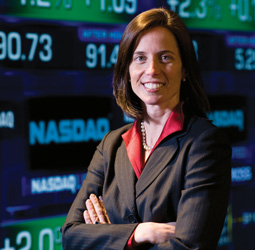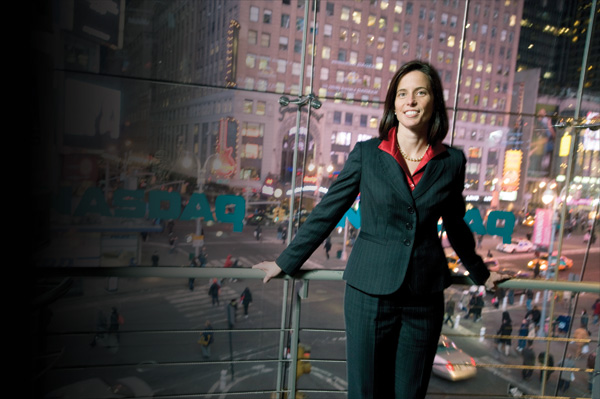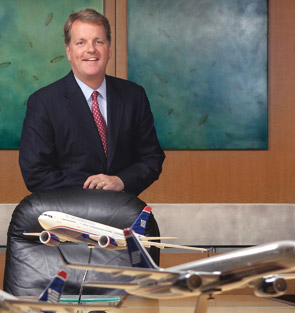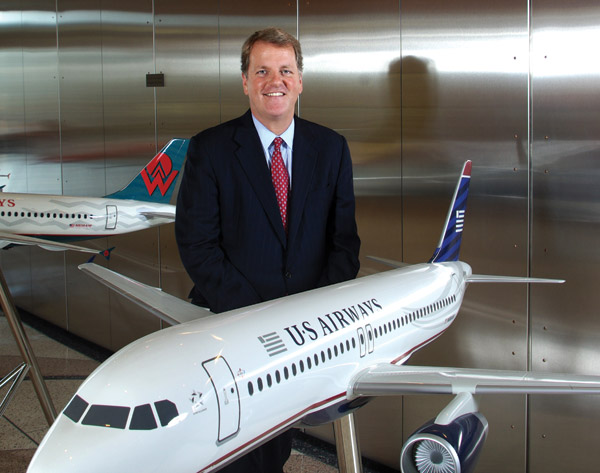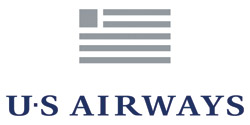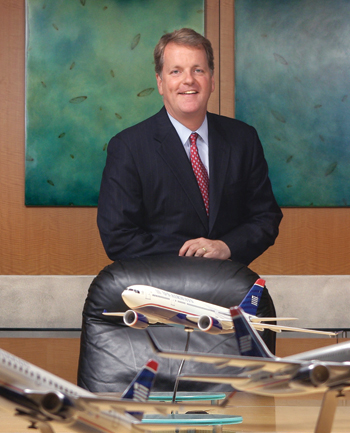Catalina Lizarralde—“Cata” to her friends—seems to operate at the accelerated pace of time-lapse photography. Or at least that’s how it can appear to those who, like Dean Eric Johnson, describe her as a powerhouse of energy and innovation.

Give her just a little time, and Lizarralde, a second-year MBA student, gets a lot done. A native of Colombia who grew up in Ecuador, Lizarralde spent a year in Austria after high school studying music and honing her Deutsch. While there, she found time to volunteer at the 2006 World Cup in Germany. “Who could know when another such opportunity might arise?” she decided.
The next year, without fully mastering English, Lizarralde was in Columbus, Ohio, pursuing a bachelor’s degree. Amid a difficult job market following the financial crash in 2008, she reasoned, “I thought if I graduated faster it would show employers I could work at a high level.” She graduated from Ohio State with a double major in just three years.
She was right. After graduation, Lizarralde went straight to New York, where she’d landed a job as a strategy and operations consultant with Deloitte. Working with clients around the United States and internationally, she says, “I learned that companies can be very different across industries and regions, but what drives their success is the caliber of their leaders.”
Two new chief executives
She arrived at Vanderbilt in August 2013. Opting to pursue an MBA because she believes it is the best way to grow as a business leader, it’s not surprising that Lizarralde was elected to the Owen Student Government Association three weeks after arriving on campus—or that she is serving this year as OSGA’s president.
Owen’s other new female chief executive—Erika Bogar King, MBA’99—took a more deliberate approach, both to her career and to her newly assumed leadership of the Owen Alumni Board.
For one thing, she says, she waited a little longer than most of her classmates (she was in her late 20s) to seek an MBA. For another, she didn’t immerse herself into activities. “I wasn’t hyperinvolved as a student,” says King, who serves as senior vice president of human resources for Avanade, a technology professional services firm established as a joint venture between Microsoft and Accenture.
In fact, though she met her future husband, Rogers King, MBA’99, at Owen—they had classes together during the first two mods—King even took a deliberate approach to their relationship. “We didn’t start dating until much later in the year,” she says, recalling the academic demands of that first fall.
It was as a student that she realized what a gift alumni give when they come back to campus. She saw, she says, how valuable it was to “have alumni with real-life experience coming in and talking about what they’ve done in the real world.”

King concentrated her MBA in human resources and organization management and joined Deloitte after graduation. In her two decades with the global giant, she moved from Deloitte Consulting’s Human Capital practice to leading Performance Management, where she focused on best practices, standards and tools, performance programs and effectiveness measures for all Deloitte U.S. firms.
Shaped by personal experience
Though Lizarralde and King took divergent paths, their respective presidencies illustrate something quintessentially Owen: They are drawing on their own perspectives, styles and experiences to help shape how students and alumni interact with the school.
Lizarralde’s international background, for example, has given her a wide-angle lens to view opportunities for new OSGA initiatives. During her year in Austria, and even more as an undergrad in the Midwest, Lizarralde grappled with what she calls the cultural adjustment. But she also gained an acute appreciation for the advantages of working with diverse types of people.
That shaping experience, in turn, gave Lizarralde a clearer sense of what she might contribute as a leader. “Even though we have an international community here,” she says, “it’s not that large because the school itself is small. I felt like I could add value because a lot of students hadn’t been exposed to other cultures. And I wanted international students to understand you can really make a difference here.”
Under Lizarralde’s leadership, Johnson says, “OSGA has already launched several initiatives to build the Owen community and expand our global perspective.” And that was before the new academic year even began.
Connecting students
After being elected in March, Lizarralde and OSGA senators and committees explored ways to increase the interaction between students from differing years and backgrounds. One of their big ideas—an international immersion and trip for incoming students—was rapidly adopted, and implemented barely three months later.
“It was the first time we’d had something structured like this,” Lizarralde explains. “We worked with the dean, and we created trips to Costa Rica for July that would be led by faculty and staff. The trips would provide some bonding but also include a component on how international business is done.”
The OSGA team finished planning the details before the end of April, when Lizarralde left for New York and a summer internship with Diageo, the beverage company that owns such household names as Crown Royal and Guinness.

The internship didn’t interrupt Lizarralde’s work for OSGA. During the summer, she and her team worked with the Career Management Center to develop a timeline checklist to help incoming students better organize themselves. She and three members of OSGA’s international student committee also created a guidebook for international students. “When I came here, I didn’t know where to grocery shop, where to bank, where to get a driver’s license, or what I should avoid,” she explains. “We hope that having a guide like this can make the first-year experience easier.”
And as the first mod in the fall began, OSGA was busy implementing a new program to increase interaction between first- and second-year MBA students. “Our idea,” Lizarralde explains, “was to divide the community into pods of 20 people, and give each pod a budget to do something fun together during the semester. We think this will especially benefit people who are less outgoing as well as the international students.”
Giving back from day one
Just as Lizarralde’s ideas for OSGA were influenced by her international background, King’s perspective on the efforts of the Alumni Board were shaped by her own experience as a young alum. While giving back has always been important to her—she and her husband both serve on the board of a nonprofit organization that supports early learning and quality childcare—she found that, in the years after graduating from Vanderbilt, her contributions to the school involved gifts of time more than money.

Her postgraduation job in consulting enabled her to fly to Nashville from client sites easily. So at first, King maintained her connection with Owen by speaking to the consulting club, then at events for women in business, then as part of a series on leadership, then as an Alumni Board member. “In any area where I had subject knowledge, I’d go back and meet the students and share my thoughts,” she says. “To me, that’s one of the best ways our alumni can give back.”
Understandably, one particular interest for King as a new board president is engaging more young alumni more deeply into the life of the school. Perhaps looking back on her own experience as a newly minted Vanderbilt MBA, King says, “I think sometimes people think the only way you can participate is with your money, and that’s not true.
“A recent alum may not be in a position to give money or to make hiring decisions, but they can offer insight to students or help them get an internship. From there, they might be in a position later to come speak to a class,” she says. “We hope to engage people early, in small ways, and then see that engagement grow.”
The effort is part of a broader diversification strategy that the board is developing in consultation with the dean. Within the next several years, Owen will have more than 10,000 alumni, increasingly dispersed across the United States and around the world. “It calls for a little more formality around how we engage those alumni,” says King, whose own work routine—she travels frequently between her home in Atlanta and Microsoft’s Seattle headquarters—illustrates Vanderbilt’s geographic reach. “We’re not a regional school anymore. We don’t all know each other.”
Connecting alumni
One strategy the board is pursuing involves building on the successful City Owen events, which aim to increase opportunities for alumni to meet other Owen graduates in their market. “This year,” she says, “we’re looking at experimenting with events in smaller cities, like Chattanooga, and regional events.
“The Owen alumni office can’t do it all by themselves, so the onus is on the alumni board to recruit more people to get involved, and then ask each of these volunteers to bring five new people into the fold every year. If we set this up properly, it will sort of take off on its own,” she says.
In keeping with the evolution of the school’s student and alumni population, King and her colleagues are looking to tweak the composition of the board’s diversity in terms of age, race, gender, business area and location. “That has always been a goal,” she points out, “but we are being more intentional about it.”
For example, the alumni group has established a goal of filling eight of its 40 board slots with young alumni, including graduates of Vanderbilt’s one-year Master of Finance, Master of Accountancy and MAcc Valuation programs for young professionals.
Additionally, the board is exploring ways to involve international alumni in particular. “If we have 500 international alums, should we have formal representation for them on the board as a segment, given the time zone and geographical challenges?” King says. “How can we make it work?”

Dynamic leadership
One reason the Alumni Board and OSGA are both working well, according to Johnson, is the quality of leadership. “I am grateful to have this pair of dynamic women leading at Owen,” he says.
For their part, King and Lizarralde credit the strong teams of students and alumni working with them, and others in previous years who helped build a strong foundation. But perhaps, too, there’s a cultural factor at work at Owen that makes people want to be involved during and after their years in school.
“The administration lets us have a real voice,” Lizarralde says. “That’s why it’s easier to get things done here. There is a lot of trust and a lot of communication. Princeton Review named Vanderbilt as having the happiest students, and I think it’s true with Owen, too. It’s because we feel that connection with leadership.”


 There are a few things all graduates from a top MBA
There are a few things all graduates from a top MBA 


















 A photograph of a smiling young man standing beside a gas pump at a Spur Gas station in Henderson, Ky., sits in the offices of Gigi Lazenby, BA’67, MBA’73. The year was 1931 and the young man—her father, Paul Banks Jr.—would eventually work his way to President of that same company, Spur Distributing.
A photograph of a smiling young man standing beside a gas pump at a Spur Gas station in Henderson, Ky., sits in the offices of Gigi Lazenby, BA’67, MBA’73. The year was 1931 and the young man—her father, Paul Banks Jr.—would eventually work his way to President of that same company, Spur Distributing.







 Mario Ramos has a hard time containing his excitement about the freshly unveiled
Mario Ramos has a hard time containing his excitement about the freshly unveiled 






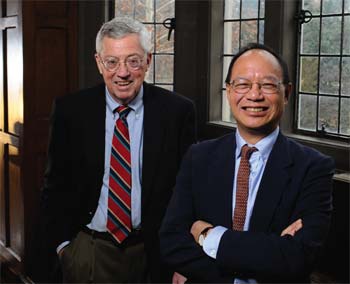
 Market impact. It is part of the very fiber of Owen’s finance department. Members of the school’s finance faculty are not only contributing to the industry’s intellectual underpinnings and analytical tools but also training students who, as Vanderbilt alumni, are putting theory into practice worldwide. We look here at some of the key players who are helping shape the face of modern financial management.
Market impact. It is part of the very fiber of Owen’s finance department. Members of the school’s finance faculty are not only contributing to the industry’s intellectual underpinnings and analytical tools but also training students who, as Vanderbilt alumni, are putting theory into practice worldwide. We look here at some of the key players who are helping shape the face of modern financial management.






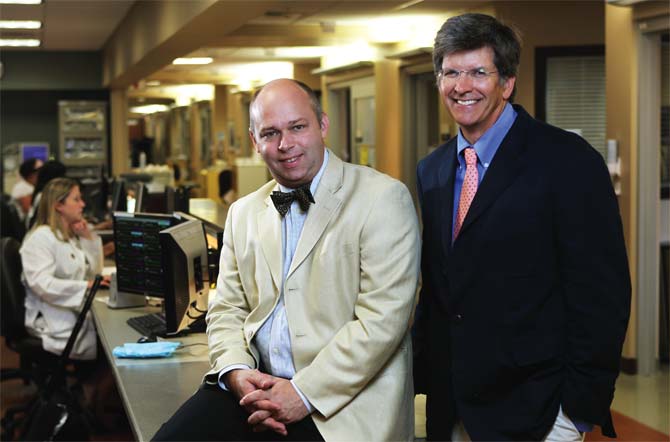
 Four years ago Christopher Parks found himself facing an all-too-common dilemma. He and his mother, who was in the midst of cancer treatments, were sitting in her living room going through a stack of her medical bills and those of his father, who had died recently.
Four years ago Christopher Parks found himself facing an all-too-common dilemma. He and his mother, who was in the midst of cancer treatments, were sitting in her living room going through a stack of her medical bills and those of his father, who had died recently.












